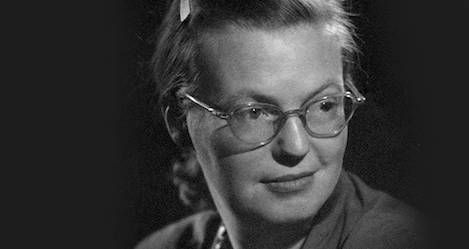
The Magic of Shirley Jackson’s Opening Paragraphs
Much has been said about the opening paragraph of Shirley Jackson’s (arguably) most famous novel, The Haunting of Hill House. It is evocative and concise, every word chosen with absolute care. It frightens the living daylights out of me. There is an excellent analysis of the paragraph, written by Random House copy chief Benjamin Dreyer, here. I myself have often thought that the opening paragraph of her final published novel, We Have Always Lived In The Castle, rivals that of The Haunting in its sheer perfection. We learn everything that we need to know about Merricat in its few sentences.

Shirley Jackson, born 100 years ago December 14th, had six novels published; the incomplete novel that she was working on at the time of her death was published posthumously. She also published two fictionalized memoirs about her family life, compiled from stories published in various ladies’ magazines. I wondered what the opening paragraphs of her other books looked like, and how they compare to the great ones. They are transcribed below, with a few comments. With the exception of her memoirs and her final unfinished novel, I have not included story collections (because how would I choose an opening paragraph?).
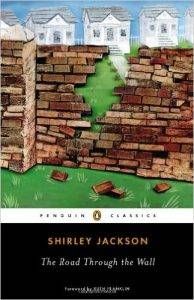 The Road Through The Wall (1948)
The Road Through The Wall (1948)
Mrs. Merriam came to her back window, which saw Mrs. Fielding’s house and Pepper Street beyond, and looked anxiously down Pepper Street. Mrs. Merriam’s clock had stopped; it was easier to look out the back window than go upstairs to the bedroom clock. Mrs. Merriam’s kitchen had a built-in electric clock (and a built-in dishwasher and a built-in refrigerator) but the electric clock had broken long ago, and when the refrigerator broke and the electrician came to fix it Mrs. Merriam could have him fix the clock. So that when the living room clock stopped Mrs. Merriam was without the time downstairs.
I read this book nearly two decades ago and was not able to keep track of its many characters. I cheated here by transcribing the first paragraph of Chapter 1 despite there being a convoluted first paragraph in the prologue which includes multiple named characters. This paragraph is a better introduction to the story, in my opinion. I believe my edition has a typo in the final sentence, though.
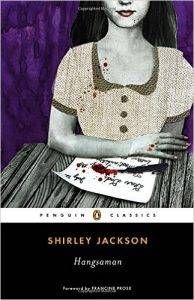 Hangsaman (1951)
Hangsaman (1951)
Mr. Arnold Waite–husband, parent, man of his word–invariably leaned back in his chair after his second cup of breakfast coffee and looked with some disbelief at his wife and two children. His chair was situated so that when he put his head back the sunlight, winter or summer, touched his unfaded hair with an air at once angelic and indifferent–indifferent because, like himself, it found belief not an essential factor to its continued existence. When Mr. Waite turned his head to regard his wife and children the sunlight moved with him, broken into patterns on the table and floor.
It’s been so long since I read this book that I barely remember anything about it, but I am quite certain that Mr. Arnold Waite is terrifying.
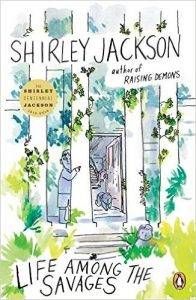 Life Among The Savages (1953)
Life Among The Savages (1953)
Our house is old, and noisy, and full. When we moved into it we had two children and about five thousand books; I expect that when we finally overflow and move out again we will have perhaps twenty children and easily half a million books; we also own assorted beds and tables and chairs and rocking horses and lamps and doll dresses and shop models and paint brushes and literally thousands of socks. This is the way of life my husband and I have fallen into, inadvertently, as though we had fallen into a well and decided that since there was no way out we might as well stay there and set up a chair and a desk and a light of some kind; even though this is our way of life, and the only one we know, it is occasionally bewildering, and perhaps even inexplicable to the sort of person who does not have that swift, accurate conviction that he is going to step on a broken celluloid doll in the dark. I cannot think of a preferable way of life except one without children and without books, going on soundlessly in an apartment hotel where they do the cleaning for you and send up your meals and all you have to do is lie on a couch–as I say, I cannot think of a preferable way of life, but then I have had to make a good many compromises, all told.
The first two Shirley Jackson books that I read were The Haunting of Hill House and this one. I knew, even at age 20, that she was a witch and I was under her spell and it was best to just let it happen to me and my life would be better for it; I was right.
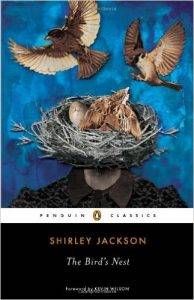 The Bird’s Nest (1954)
The Bird’s Nest (1954)
Although the museum was well known to be a seat of enormous learning, its foundations had begun to sag. This produced in the building an odd, and disturbingly apparent, list to the west, and in the daughters of the town, whose energetic borrowings had raised the funds to sustain the museum, infinite shame and a tendency to blame one another. It was at the same time a cause of much amusement among the museum personnel, whose several vocations were most immediately affected by the decided slant given to the floors of their building. The proprietor of the dinosaur was, as a matter of fact, very humorous about the almost foetal tilt of his august bones, and the numismatist, whose specimens tended to slide together and jar one another, was heard to remark–almost to tedium–upon the classical juxtapositions thus achieved. The stuffed bird man and the astronomer, whose lives were spent in any case almost out of earthly equilibrium, professed themselves unaffected by the drop of one side of the building, unless driven toward a kind of banking curve to offset the natural results of walking on tipped floors; walking was, in any case, an unfamiliar movement to either of them, one tending toward flight and the other toward the complacent whirling of the spheres. The very learned professor of archeology, going inattentively along the slanted corridors, had been seen hopefully contemplating the buckled foundations. The contractor and the architect, along with the ill-tempered daughters of the town, endeavored to blame first the inefficient materials supplied for the building and second the extraordinary weight of some of the antiquities contained therein; the local paper printed an editorial criticizing the museum authorities for allowing a meteor and a mineral collection and an entire arsenal from the Civil War, dug up just outside of town and including two cannon, to be lodged all on the west side of the building; the editorial pointed out soberly that, had the exhibit of famous signatures, and of local costume through the ages, been settled on the west side, the building might not have sagged, or might at least not done so during the lifetimes of its sponsors. Since the local paper–current and impermanent–was not permitted below the third, or clerical, floor of the museum, the exhibits were allowed to retain their impractical arrangements unmoved by the editorials, although the clerical employees on the third floor read the comics daily and studied the front pages hoping to discover the manners of their deaths. They were given, on the third floor, to meditation, and they believed almost everything they read. In this, of course, they differed in almost no way from the educated inhabitants of the first and second floors who dwelt among unperishing remnants of the past, and made little wry jokes about disintegration.
In the edition I own, The Magic of Shirley Jackson, this opening paragraph takes up one and a half pages. That is, in my opinion, entirely too much opening paragraph, which is a shame because this one is quite wonderful if one can get all the way through it.
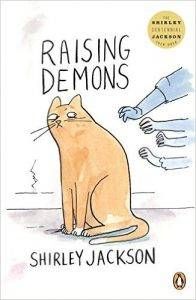 Raising Demons (1957)
Raising Demons (1957)
I do not now have the slightest understand of the events which got us out of one big white house which we rented into another, bigger white house which we own, at least in part. That is, I know we moved, and I think I know why, and I know we spent three pleasant months in a friend’s summer home, and I am pretty sure we got most of our own furniture back. What really puzzles me, I suppose, is how a series of events like that gets itself started. One day I went to clean out the hall closet and the next thing I knew we were trying to decide whether to have all four phones put on one line, or leave them all different numbers and list ourselves four times in the phone book, We decided wrong, by the way. What with the phone starting to ring for Laurie at eight in the morning and for Jannie about noon and for Sally in the early afternoon and every now and then–a high, uncomfortable voice, stammering and usually hanging up unexpectedly–for Barry, we know now that we should have left the four phones separate. We should have listed three of them for the children and kept the fourth one private, giving out the number to the two or three people who either have no children of their own or are still optimistic enough to try to telephone their friends.
Resolved: That Shirley Jackson would have loved smartphones and social media, and would have been monstrous on Twitter.
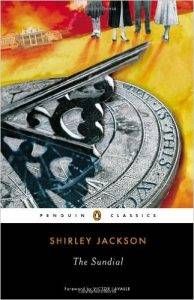 The Sundial (1958)
The Sundial (1958)
After the funeral they came back to the house, now indisputably Mrs. Halloran’s. They stood uneasily, without any certainty, in the large lovely entrance hall, and watched Mrs. Halloran go into the right wing of the house to let Mr. Halloran know that Lionel’s last rites had gone off without melodrama. Young Mrs. Halloran, looking after her mother-in-law, said without hope, “Maybe she will drop dead on the doorstep. Fancy, dear, would you like to see Granny drop dead on the doorstep?”
This is another novel that I have not read in ages, but I feel that this opening practically hands you the information that it is about terrible people at (perhaps) the end of the world.
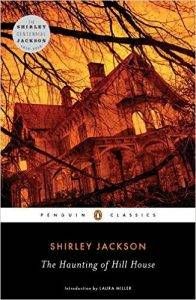 The Haunting of Hill House (1959)
The Haunting of Hill House (1959)
No live organism can continue for long to exist sanely under conditions of absolute reality; even larks and katydids are supposed, by some, to dream. Hill House, not sane, stood by itself against its hills, holding darkness within; it had stood so for eighty years and might stand for eighty more. Within, walls continued upright, bricks met nearly, floors were firm, and doors were sensibly shut; silence lay steadily against the wood and stone of Hill House, and whatever walked there, walked alone.
I dare you to read that paragraph and then turn off all the lights alone at night.
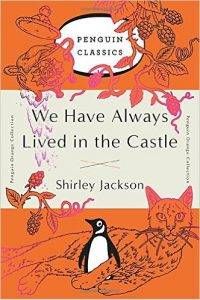 We Have Always Lived In The Castle (1962)
We Have Always Lived In The Castle (1962)
My name is Mary Katherine Blackwood. I am eighteen years old, and I live with my sister Constance. I have often thought that with any luck at all I could have been born a werewolf, because the two middle fingers on both my hands are the same length, but I have had to be content with what I had. I dislike washing myself, and dogs, and noise. I like my sister Constance, and Richard Plantagenet, and Amanita phalloides, the death-cup mushroom. Everyone else in my family is dead.
In case your memory is as terrible as mine: that may or may not be a reference to Richard the Lionheart; there were a few Kings of England and several Dukes of York with the same name, the third of whom started the War of the Roses.
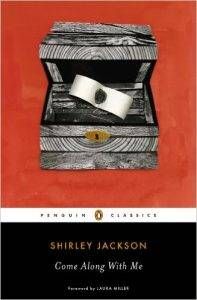 Come Along With Me (1968)
Come Along With Me (1968)
I always believe in eating when I can. I had plenty of money and no name when I got off the train and even though I had had lunch in the dining car I liked the idea of stopping off for coffee and a doughnut while I decided exactly which way I intended to go, or which was I was intended to go. I do not believe in turning one way or another without consideration, but then neither do I believe that anything is positively necessary at any given time. I got off the train with plenty of money; I needed a name and a place to go; enjoyment and excitement and a fine high gleefulness I knew I could provide on my own.
I think it is safe to say that I will never get over this novel remaining unfinished. I love a narrator who tells you from the get go that she is unreliable.
So…which opening paragraph is your favorite? What do you think of the progression through time? Did her writing improve, or at least become more concise? I think so.














